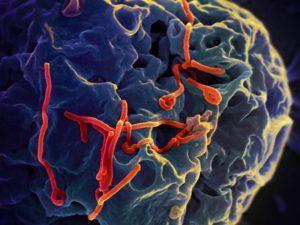With the recent Ebola cases identified in the Democratic Republic of Congo, the need for a protective vaccine to prevent and control future outbreaks is once again highlighted. Researchers from the Albert Einstein College of Medicine have isolated and characterized monoclonal antibodies (mAbs) from an Ebola survivor which are able to neutralize various strains of the virus. Understanding the mode of action of these antibodies may aid in the development of an effective antibody-based Ebola vaccine.
There are several strains of Ebola virus,including Zaire, Sudan, Bundibugyo, Tai Forest and Reston (only in primate). A vaccine which can protect against all or most of the Ebola strains would be advantageous and therefore researchers, led by Zachary Bornholdt, searched for cross-reactive neutralizing antibodies from Ebola survivors. Understanding these antibodies could help in the design of an immunogen capable of eliciting cross-reactive responses.
The researchers identified mAbs that were able to protect against three types of Ebola virus. The researchers mapped the epitope of these antibodies and found that they bind to an inter-protomer epitope on the fusion loop of the Ebola glycoprotein. This region is well conserved across Ebola virus strains as it is essential in viral fusion to the host cell. The mode of action of these mAbs was through targeting the fusion-intermediate of the Ebola glycoprotein and thus preventing infection.
As opposed to HIV broadly neutralizing antibodies which require high levels of affinity maturation, the isolated Ebola mAbs required very little somatic hypermutation to achieve neutralization breadth. This suggests that these antibodies could be easy to elicit upon triggering with a suitable immunogen.
Together, this study demonstrates that an antibody-based vaccine which elicits cross-reactive antibodies may be effective in preventing the acquisition of different Ebola strains. This studies also opens the doors for passive immunization trials with mAbs to take place.
Journal article: Wec et al., 2017. Antibodies from a Human Survivor Define Sites of Vulnerability for Broad Protection against Ebolaviruses. Cell
Article by Thandeka Moyo












